Supreme Court Appears Willing To Uphold Exception To ‘Double Jeopardy’ Clause
The Supreme Court appears reluctant to overturn a century of case law that established a significant exception to the Double Jeopardy Clause.
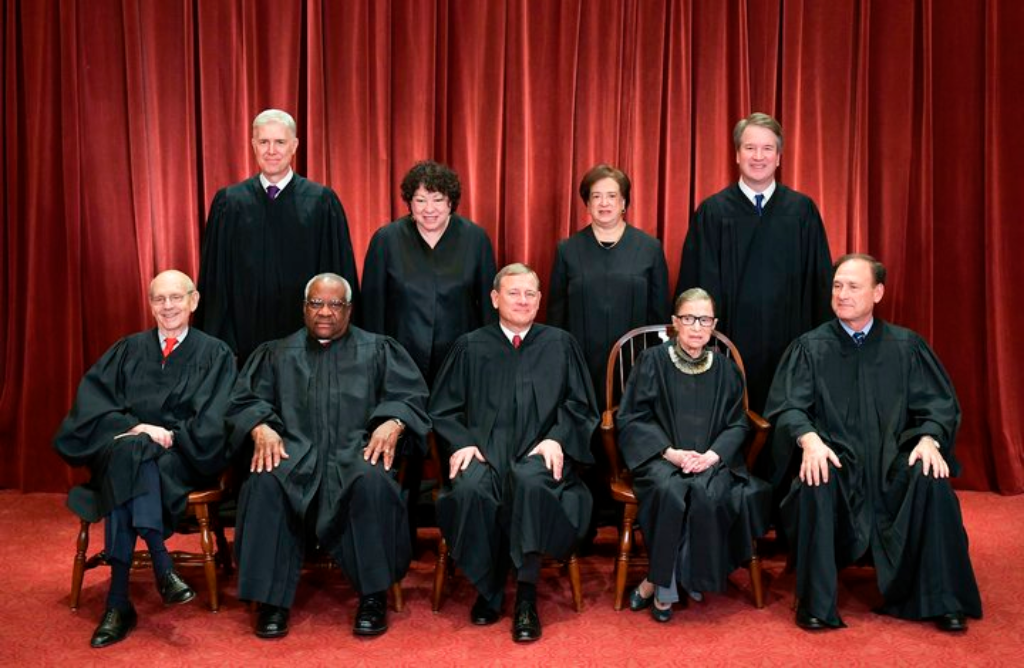
As I noted earlier this week, the Supreme Court heard oral argument on Thursday in a case challenging nearly a century of case law regarding the application of the Double Jeopardy Clause and the so-called “separate sovereigns” doctrine that allows for an exception to the clauses rule barring more than one prosecution for the same offense in state and Federal Courts. Based on some comments in previous cases by Justices who are normally far apart on the Court’s ideological spectrum such as Justices Clarence Thomas and Ruth Bader Ginsburg and the fact that the Court had agreed to take the case at all, there has been some speculation that there could be a desire on the Court to at least limit the doctrine, which many defense attorneys contend is often used by prosecutors to pressure Defendants into confessions, By the end of the extended argument, though, it seemed as if there are a majority of Justices willing to keep existing law in place:
WASHINGTON — In an extended argument on Thursday that touched on history, the role of precedent and fundamental questions of constitutional interpretation, the Supreme Court considered whether it should overrule a series of decisions that sometimes allowed criminal defendants to be prosecuted twice for the same crimes.
There did not seem to be a majority ready to make that move.
The Constitution’s double jeopardy clause generally forbids subsequent prosecutions. But the Supreme Court has made one exception. Saying that the federal government and the states are independent sovereigns, the court has allowed separate prosecutions of the same conduct in state and federal courts.
The case before the justices has attracted attention because the court’s decision could have implications for the legal problems faced by associates of President Trump. Should he pardon them for federal crimes, a Supreme Court ruling that alters the definition of double jeopardy could complicate efforts by state prosecutors to pursue parallel charges.
But the justices gave no indications on Thursday that they were focused on such issues. Instead, they debated the doctrine of stare decisis, which is Latin for “to stand by things decided.”
Stare decisis, Justice Elena Kagan said, “is a kind of doctrine of humility where we say we are really uncomfortable throwing over 170-year-old rules that 30 justices have approved just because we think we can kind of do it better.”
Justice Brett M. Kavanaugh appeared to agree. “The question is,” he said, “when are we going to upset that stability, when are we going to depart from the humility of respecting precedent and overrule it?”
Justice Neil M. Gorsuch warned against rushing to overrule decisions. “It took until last year for this court to overrule Korematsu,” he said, referring to a passage in the court’s decision in June upholding President Trump’s travel ban. The court disavowed Korematsu v. United States, the 1944 decision that endorsed the detention of Japanese-Americans during World War II.
Justice Stephen G. Breyer said respect for precedent must have exceptions. “If it always holds, we wouldn’t have Brown v. Board,” he said, referring to the 1954 decision that barred segregation in public schools. That decision overruled Plessy v. Ferguson, the 1896 decision that said “separate but equal” facilities were constitutional.
More from The Washington Post:
A majority of the Supreme Court sounded unlikely Thursday to overturn more than a century of doctrine that allows states and the federal government to prosecute someone for the same criminal conduct.
While it went unmentioned at the oral argument, the case has implications for any presidential pardons that President Trump might issue for those prosecuted by special counsel Robert S. Mueller III and convicted in federal court. Under the status quo, states might still be able to prosecute under their own laws those who receive a presidential pardon, which applies only to federal charges.
Usual ideological pairings were scrambled as the court took a deep dive into the Double Jeopardy Clause of the Constitution’s Fifth Amendment, which says no one shall be “subject for the same offense to be twice put in jeopardy of life or limb.” The doctrine allowing dual prosecutions in state and federal courts is an exception to the prohibition, recognized by the Supreme Court since the 19th century.
Liberal Justice Ruth Bader Ginsburg had called two years ago for a fresh look at the “separate sovereigns” doctrine and described it Thursday as a “double-whammy” for criminal defendants. The colleague most outspoken in apparent agreement with her was conservative Justice Neil M. Gorsuch.
Most adamant on the other side of the issue were conservative Justice Samuel A. Alito Jr. and liberal Justice Elena Kagan. Kagan demanded that Louis A. Chaiten, a Cleveland lawyer representing an Alabama felon, explain why the court should not apply its usual standard of letting decided issues stand, referred to as stare decisis.
“Part of what stare decisis is, is a kind of doctrine of humility where we say we are really uncomfortable throwing over 170-year-old rules that 30 justices have approved just because we think we can kind of do it better,” Kagan said.
New Justice Brett M. Kavanaugh, who during his confirmation hearings was repeatedly questioned about whether he would abide by the court’s established decisions, joined Kagan.
The formidable task for Chaiten, Kavanaugh said, was “not just to show that it’s wrong but to show that it’s grievously wrong, egregiously wrong.” When there is uncertainty about the meaning of the constitutional prohibition, Kavanaugh said, it was difficult to “clear that bar.”
Chaiten said history was on his side. “This rule is egregiously wrong. It’s a rule that — there was no practice for all of English history, no practice for the first century of this republic. That alone, I think, speaks volumes.”
But Justice Sonia Sotomayor said Chaiten’s reliance on English law did not take into account the unique American system of governance, where both states and the federal government had an interest in seeing their laws enforced.
“Why is the doctrine wrong?” she asked.
Chaiten represents Terance Gamble, who was convicted of robbery in Mobile County, Ala., in 2008 and two domestic violence charges in 2013. Under both state and federal law, such a convicted felon may not possess a firearm.
But police found one in Gamble’s car when he was stopped in 2015. Gamble pleaded guilty to the state charges and was sentenced to a year in prison. But federal prosecutors also brought charges, and he received a lengthier sentence with that conviction.
Chaiten said the dual prosecutions for such a routine gun possession charge disproved contentions by government prosecutors that they were used only in extraordinary cases.
Two years ago, in a concurring opinion in a related case, Ginsburg called for the court to reexamine its precedents allowing such prosecutions: “The double jeopardy proscription is intended to shield individuals from the harassment of multiple prosecutions for the same misconduct. Current ‘separate sovereigns’ doctrine hardly serves that objective.” Justice Clarence Thomas joined her in that opinion but was silent as usual during Thursday’s hearing.
Ginsburg, though, repeated her concerns when questioning Department of Justice lawyer Eric J. Feigin, who was defending the doctrine.
“You have to concede, won’t you, that this rule, this separate sovereign rule, has been widely criticized by both academics and federal judges?” she asked. Amicus briefs in the case have been filed by those on the left and the right.
When Feigin noted that federalism principles require allowing both federal and state prosecutors to enforce their own laws, Ginsburg and Gorsuch noted that federalism is usually invoked to protect individuals, rather than to empower governments at both levels.
Gorsuch said dual prosecutions may have been more limited when state and local officials were almost always presumed to take the lead.
“With the proliferation of federal crimes, I think over 4,000 statutes now and several hundred thousand regulations, the opportunity for the [federal] government to seek a successive prosecution if it’s unhappy with even the most routine state prosecution is a problem,” he said.
Amy Howe summarized the argument for SCOTUSBlog:
Chief Justice John Roberts was skeptical, observing that Chaiten’s leading authority for his assertion that courts in England would not have allowed successive prosecutions involved a bar on prosecutions in England after an earlier prosecution overseas. It would be “surprising,” Roberts suggested, for the new American republic to want to adopt the same rule because it would have been a significant intrusion on the fledgling country’s sovereignty.
Even more broadly, other justices were concerned that adopting Gamble’s rule would bar the federal government from prosecuting defendants who injure American citizens overseas. Justice Samuel Alito asked Chaiten about a hypothetical case in which terrorists who murdered American tourists in a foreign country are tried but acquitted there. Does that mean, Alito asked, that the terrorists can’t be prosecuted in the United States for murder?
Chaiten told Alito that in a case like that the U.S. court would have to decide whether to recognize the foreign court, but he assured Alito that such an inquiry was not necessary in Gamble’s case, which involves courts in Alabama. Justice Brett Kavanaugh pushed back, though, telling Chaiten that the Supreme Court needs to consider this question because Gamble’s position would necessarily extend to foreign prosecutions and could hamper national-security efforts.
Justice Elena Kagan also chimed in, emphasizing that Gamble is asking the court to write an opinion based on the Framers’ original understanding of the double jeopardy clause. If that original understanding reflects how England would have dealt with foreign prosecutions, she suggested, the court’s opinion would apply to foreign prosecutions as well.
Justice Stephen Breyer voiced a related concern: the possibility that a ban on successive prosecutions would harm the federal government’s ability to prosecute federal civil-rights cases and domestic violence among Indian tribes. By contrast, he asked Chaiten, is it really the case that as a practical matter, people are prosecuted twice for the same thing?
Some justices also voiced qualms about overturning the doctrine, pointing to the principle – known as stare decisis – of adhering to prior decisions. Kagan was the first to raise this issue, noting that the separate sovereigns doctrine is a “170-year-old rule” for which 30 justices have voted. Stare decisis, she stressed, is at bottom a doctrine of “humility”; we don’t want to overrule an earlier decision or rule just because we think we can do it better.
Justice Neil Gorsuch echoed Kagan’s question about stare decisis later, asking Chaiten to explain why, “of all the errors this Court has made over the years,” it should overrule the separate sovereigns doctrine. “Why should we care about this one?”
But Gorsuch later seemed to side with Justice Ruth Bader Ginsburg (who had previously suggested that the Supreme Court should reconsider the separate sovereigns doctrine) and against the government, as both justices peppered Eric Feigin, the assistant to the U.S. solicitor general who argued on behalf of the United States, with questions about federalism – the concept of dividing power between the federal and state governments. I can’t think of another case, Gorsuch mused, in which federalism is used to justify more intrusions by the government into people’s lives (here, the prospect of dual prosecutions), rather than to protect people against intrusions.
As I’ve said before it’s worth keeping in mind that oral argument is not always a good guide to determining just how a case will end up being decided. Frequently, Justices ask questions and take positions designed to test out an argument that is likely to come up during the conference where the Justices will take their initial discussion and vote on the case later this week, and the questions may be intended to try to steer the conversation between the Justices toward a certain aspect of the case. Additionally, it’s not uncommon for a Judge or Justice to play “devil’s advocate” during oral argument either for their own purposes or to subtlely point out to a fellow Justice where their argument may be wrong or may lead to unintended consequences. In the end, we really don’t know how the Court feels about this case until the decision is handed down sometime next year. Additionally, as many observers have noted before this is effectively an issue of first impression for the Justices since it has been more than 30 years since the Court last ruled on this issue and there is much about the law that has changed in the intervening time period. Notwithstanding that, though, if the oral argument is any guide it does appear as if there is a majority inclined to keep the status quo in place.
The repeated appeals to stare decisis are important because, as I’ve noted before, the “separate sovereigns” doctrine has its roots in case law that goes back nearly a century. This rule was established by the Supreme Court in a 1959 case called Abbate v. United States 359 U.S. 187 (1959), although it was actually first stated by the Court 37 years earlier in a case called United States v. Lanza 260 U.S. 377 (1922). In Lanza, a case which arose during the Prohibition era, a Defendant was prosecuted and convicted of making, transporting, and selling intoxicating liquors in violation of Washington state law. He was subsequently charged with violating the National Prohibition Act under the same set of facts. The Supreme Court ruled in that case that this subsequent Federal prosecution did not violate the Double Jeopardy clause essentially because the states and the Federal Government are separate entities and that prosecution by one does not rule out prosecution based on the same set of facts by the second. In Abbate, the Defendant was “part of [a] conspiracy to blow up multiple facilities owned by the Southern Bell Telephone Company. He was convicted in Illinois under a state law making it a crime to conspire to destroy the property of another and sentenced to three months of imprisonment. Thereafter, Abbate was indicted in [a] federal district court for a violation of federal law stemming from the same conspiracy.” (Source) Abbate’s attorney asked the Court to reconsider the ruling in Lanza that had established the dual sovereign doctrine, but the Court declined to do so.
The Justices discussion of stare decisis, of course, is rooted in the fact that the “separate sovereigns” doctrine has been in place for nearly a century now thanks to the rulings in Lanza and Abbate. Over that period of time, both the Federal Government and the states have enacted an entire system of laws that essentially depends on the presumption that individuals can be charged under both Federal and state law for criminal violations arising out of the same series of events. Additionally, the doctrine itself is well-rooted in the Tenth Amendment, Federalism, and the idea that there is a difference between the Federal and state governments. While it may be true that the doctrine has been abused to some extent over recent years, that doesn’t mean that it should be tossed out completely. Arguably, there are good reasons why the doctrine should perhaps be limited to some extent, but that isn’t the issue in this case. The sole issue here is whether or not the separate sovereigns doctrine should be overturned completely. Based on the reactions of several of the Justices during Thursday’s oral argument, it would appear that there isn’t a sufficient appetite on the Court to go that far.
In any case, we’ll have to wait until a decision is handed down to find out where the Justices stand. Until then, you can read the relevant filings in the case at the SCOTUSBlog information page for the case.
Here’s the transcript of the oral argument, which you can also listen to at the link:
Gamble v. United States Tra… by on Scribd

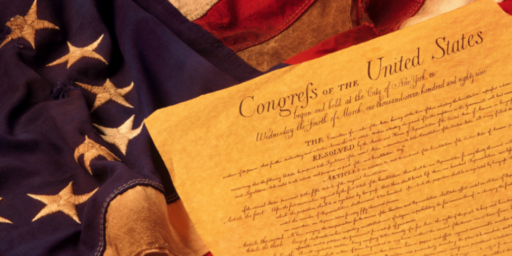
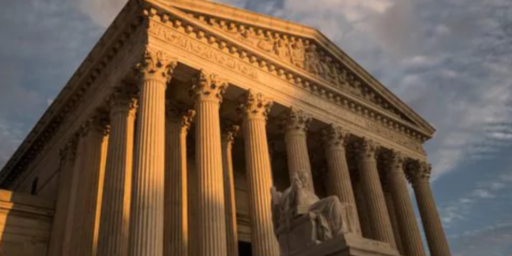
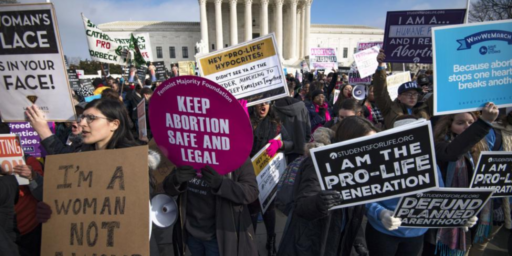
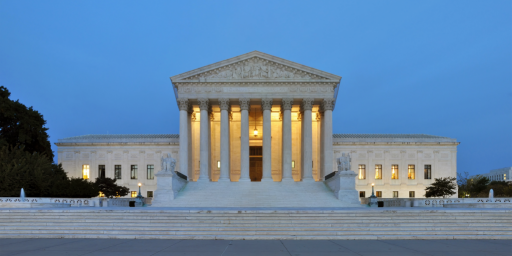

To a layman like myself, it seems as though there is a fundamental unfairness to be prosecuted under both federal and state law for the same crime. On the other hand, if this doctrine is tossed out, I can see follow on suits discussing how close the violated state and federal laws were to each other and how close were the set of facts used. I can see a state or federal prosecutor arguing that the charges filed were sufficiently different from each other that the Double Jeopardy doctrine doesn’t apply. Fixing one problem could create others down the road.